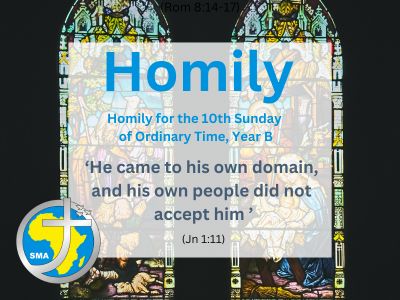Readings: Genesis 3:9-15; 2 Corinthians 4:13-5:1; Mark 3:20-35
Theme: The True Family of Jesus
From the outset conflict was part and parcel of the public life and mission of Jesus. Proclaiming and establishing the Kingdom of God, in fidelity to the will of his heavenly Father, did not meet with universal acceptance. ‘He came to his own domain, and his own people did not accept him’ (Jn 1:11). Jesus had to deal with misunderstanding, obstruction, rejection and opposition, even, as today’s gospel reading reveals, from among his own relatives. Reacting neither with anger nor annoyance, Jesus uses this conflict to teach us an important truth about the Kingdom of God, and to clarify who are the members of his true family, namely, those who do the will of God.
Discerning and carrying out the will of God, his Father, was the dominant passion of Jesus’ life. It led him to leave his home in Nazareth and assume the life of an itinerant preacher: proclaiming God’s reign of truth, justice and love, healing the sick, and liberating people from the power of evil. His words and actions presented a consistent challenge to the religious authorities of his day, who tended to restrict or exclude potential members of the Israelite community. He deliberatively sought out those who were marginalised: the poor, the blind, the lepers, those possessed by demons, prostitutes, tax-collectors and sinners. And wherever he went, he attracted huge crowds of people who were clearly impressed by his gracious words and powerful actions.
In today’s gospel reading Mark tells us that when Jesus and his disciples arrived back home in Nazareth, such a huge crowd of people gathered around him ‘that they could not even have a meal’ (Mk 3:30). Sadly, neither his relatives nor the religious experts from Jerusalem, who had come to check him out, are among his admirers. His relatives, Mark informs us, ‘set out to take charge of him, convinced he was out of his mind’ (Mk 3:21). The religious experts, who cannot deny the power Jesus has over evil spirits, claim that ‘it is through the prince of devils that he casts devils out’ (Mk 3:22). In other words, they are accusing Jesus of being in league with the very forces of evil he wishes to defeat. Calmly, Jesus points out the logical absurdity of their accusation. Satan cannot cast out Satan, for, in that case, he would be using his power to defeat himself. What is really happening, Jesus points out, is that someone stronger than Satan (Jesus) has come to overthrow him and liberate his captives (cf. Mk 3:26-27). Then Jesus warns his accusers that their hardness of heart and implacable opposition to him may lead them to ‘blaspheme against the Holy Spirit’ (Mk 3:29), the only unforgivable sin – unforgivable, because it represents the absolute refusal of God’s love.
Mark then tells us that Jesus’ mother and brothers have arrived. Waiting outside the house where Jesus and his disciples are staying, they ‘send in a message asking for him’ (Mk 3:32). And Jesus responds by asking: ‘“Who are my mother and my brothers?” And looking round at those sitting in a circle around him, he said, “Here are my mother and my brothers!”’ (Mk 3:34). This response may seem harsh to our ears. It echoes his response to Mary and Joseph when, after three days of searching, they found him (a twelve year old boy), engaged in conversation with the doctors of the Law: ‘Did you not know I must be busy with my Father’s affairs’ (Lk 2:49). It is important to understand correctly Jesus’ words. He is not disowning his mother or brothers but creating a new and larger family of relationships. ‘Whoever does the will of God is my brother and sister and mother’ (Mk 3:35).
Jesus is establishing a new way for people to relate to one other. He is creating a family in which we are brothers and sisters to each other, not on the basis of blood, or culture, or race, or nationality, but solely on our belonging to him and doing the will of God, our Father. He is calling his followers to leave behind the security of their familiar but narrow worlds and cross the threshold of a new and radical kind of existence, based on the all-embracing and gratuitous love of God for sinful humanity. And no one is excluded from this love of God ‘who causes his sun to rise on bad as well as good, and sends down rain to fall on the upright and the wicked alike’ (Mt 5:45). The new family of Jesus challenges us to cross national, cultural and social boundaries and build authentic human community on the basis of God’s reign of justice, peace and love.
Today’s gospel invites us to ask ourselves, how well do we respond to Jesus’ call to belong to his family? To what extent do we reach out beyond the divisions of race, colour, gender, religion, class, education, to embrace others as truly our brothers and sisters and create a home where all can dwell? In our second reading today, St Paul reminds us that God is the ultimate destiny of our true belonging: ‘For we know that, when the tent that we live in on earth is folded up, there is a house built by God for us, an everlasting home not made by human hands, in the heavens.
Let that house, where God speaks and we listen, be our true home!
Michael McCabe SMA
Click on the play button below to listen to an alternative homily from Fr Tom Casey SMA.
|
|

